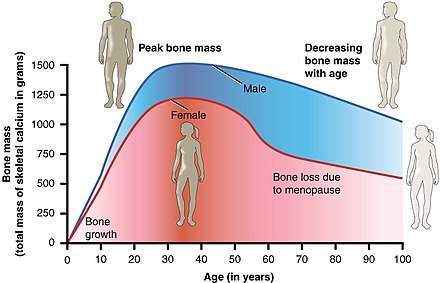Menopause
Menopause, also known as the climacteric, is the time when menstrual periods permanently stop, marking the end of a woman's reproductive years. This natural change typically occurs between the ages of 45 and 55, but can vary.
Factors such as smoking can lead to earlier onset. Menopause can also be induced by surgical removal of both ovaries or certain types of chemotherapy. At the physiological level, menopause is driven by a decrease in the ovaries' production of oestrogen and progesterone.

Signs and Symptoms
Menopause is defined as having occurred when a woman has not had any menstrual bleeding for a year. In the years leading up to menopause (perimenopause), menstrual cycles often become irregular.
Common symptoms include hot flashes, night sweats, vaginal dryness, sleep disturbances, and mood changes. Hot flashes typically last from 30 seconds to ten minutes and can recur for four to five years. Other symptoms include joint pain and changes in cholesterol profiles, which increase the risk of osteoporosis, fractures, and cardio-metabolic disease.

Urogenital Tract
During the transition to menopause, menstrual patterns may show shorter cycling and irregular bleeding. Post-menopausal women may experience painful intercourse, vaginal dryness, and atrophic vaginitis. These symptoms can continue through postmenopause and require appropriate management.

Other Physical Effects
Bone mineral density, especially of the vertebrae, decreases with menopause, increasing the risk of osteoporosis and fractures. Common physical symptoms include night sweats, hot flashes, joint soreness, and weight gain.

Mood and Memory Effects
Psychological symptoms such as anxiety, poor memory, and mood swings are common but not specific to menopause. These symptoms can be exacerbated by lack of sleep and stress. There is evidence of small decreases in verbal memory during menopause, which tend to resolve postmenopause.
Long-term Effects
Exposure to endogenous oestrogen during reproductive years provides protection against cardiovascular disease, which is lost around ten years after menopause. Postmenopausal women are at increased risk of cardiovascular disease, insulin resistance, and dyslipidaemia.
Diagnosis
Diagnosis of menopause is primarily clinical, based on the absence of menstrual periods for a year. Blood tests measuring hormone levels such as follicle-stimulating hormone (FSH) can also confirm menopause.
Management
Menopausal Hormone Therapy
Menopausal hormone therapy (MHT) is effective for treating menopausal symptoms, particularly hot flashes. MHT involves the use of oestrogen alone or in combination with progestogen. However, MHT is associated with increased risks of strokes, blood clots, and possibly breast cancer. It is generally recommended only for women at significant risk for whom other therapies are unsuitable.
Selective Oestrogen Receptor Modulators
Selective oestrogen receptor modulators (SERMs) such as raloxifene and tamoxifen act on oestrogen receptors to provide relief from menopausal symptoms. Raloxifene is particularly useful in preventing vertebral fractures and reducing the risk of invasive breast cancer.
Other Medications
SSRIs and SNRIs, such as paroxetine and venlafaxine, can provide some relief from vasomotor symptoms. Gabapentin and fezolinetant are also effective but may have side effects like drowsiness and headaches.
Lifestyle and Exercise
Exercise may help with sleep problems and overall well-being, although evidence for its effectiveness in reducing menopausal symptoms is limited. A high BMI is a risk factor for vasomotor symptoms, so weight loss may be beneficial.
Alternative Medicine
There is no consistent evidence supporting the effectiveness of alternative therapies, dietary supplements, or herbal products for managing menopausal symptoms.
Other Efforts
Vaginal moisturisers and lubricants can help manage dryness. Low-dose vaginal oestrogen products can address vaginal atrophy with minimal systemic absorption. Counselling and support groups can provide emotional support during this transition.
Society and Culture
Attitudes towards menopause vary widely, influenced by cultural, social, and personal factors. In some cultures, menopause is seen as a positive transition, while in others, it is viewed negatively. Celebrities and media campaigns have increased awareness and reduced the stigma associated with menopause, encouraging more women to seek treatment and support.

Self-assessment MCQs (single best answer)
What is the typical age range for the onset of natural menopause?
Which of the following is a common symptom of menopause?
What hormone levels are primarily responsible for the physiological changes in menopause?
What is the term for the period leading up to menopause?
Which therapy is commonly used to treat menopausal symptoms but carries risks such as blood clots and breast cancer?
What is a common long-term effect of menopause?
Vaginal dryness and painful intercourse in postmenopausal women are symptoms of what condition?
What is a possible non-hormonal treatment for vasomotor symptoms in menopausal women?
What is the impact of menopause on bone mineral density?
Which lifestyle change can help manage menopausal symptoms, particularly vasomotor symptoms?
Dentaljuce
Dentaljuce provides Enhanced Continuing Professional Development (CPD) with GDC-approved Certificates for dental professionals worldwide.
Founded in 2009 by the award-winning Masters team from the School of Dentistry at the University of Birmingham, Dentaljuce has established itself as the leading platform for online CPD.
With over 100 high-quality online courses available for a single annual membership fee, Dentaljuce offers comprehensive e-learning designed for busy dental professionals.
The courses cover a complete range of topics, from clinical skills to patient communication, and are suitable for dentists, nurses, hygienists, therapists, students, and practice managers.
Dentaljuce features Dr. Aiden, a dentally trained AI-powered personal tutor available 24/7 to assist with queries and provide guidance through complex topics, enhancing the learning experience.
Check out our range of courses, or sign up now!


